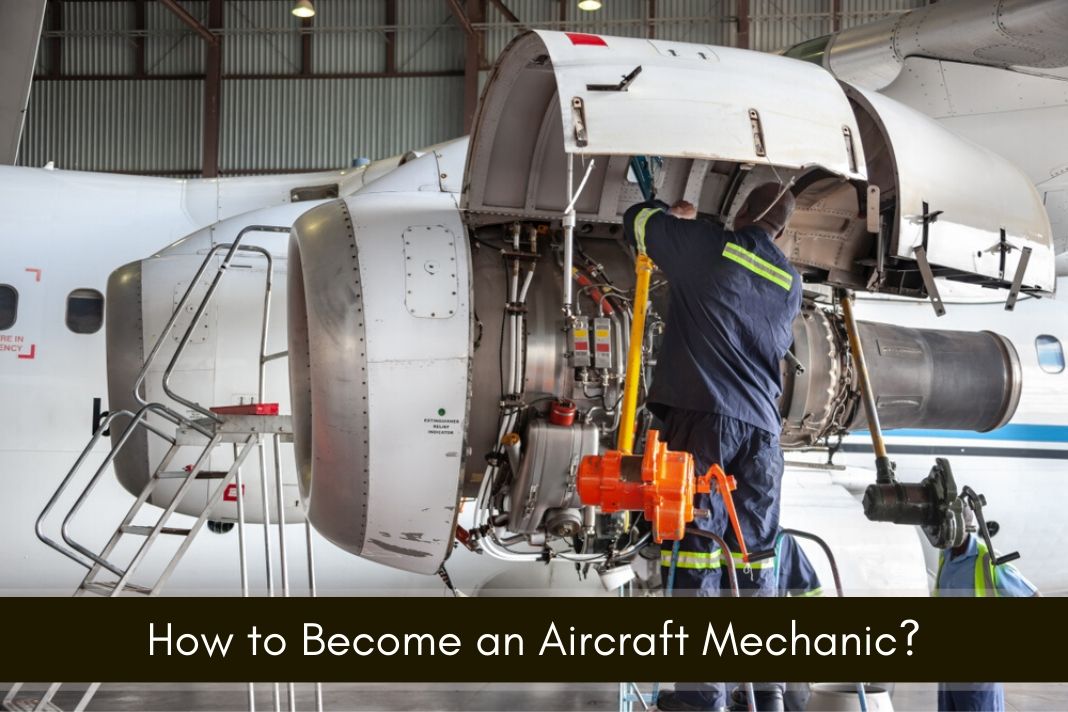
Airplanes are continuously taking off and landing, so it is very important that maintenance be done professionally and speedily. Aircraft mechanics help guarantee that aircrafts and other machineries are safe and functioning properly by executing routine repairs and maintenance. Know how to become an aircraft mechanic.
They normally work in hangars, at repair stations, or on airfields, all of which are typically near major airports. Such mechanics normally work on aircrafts in repair stations, hangars, or even on airfields. This job can be physically demanding and require teamwork. Aircraft mechanics should be comfortable working in small, enclosed spaces or with heights.
Aircraft mechanics must have deftness, a thorough knowledge of electrical systems, engines, and technical instruments, and the capability to troubleshoot and resolve difficulties. Figuring out what kind of planes you wish to work on is the initial step to becoming an aircraft mechanic.
Training Required
To become an aircraft mechanic you normally have to complete a traineeship or apprenticeship. Training for aircraft mechanics is not about taking tests or just sitting in lecture halls. One of the things you will see yourself doing, while learning aircraft mechanics, is taking apart and putting engines and complete aircraft structures together.
You will do this a lot to help you better comprehend how various parts of aircrafts work. Using a combination of classroom lecture and practical experience, aircraft mechanic applicants will be taught to maintain each part of an aircraft, developing specialists in aircraft repair and maintenance.
Many aircraft mechanics learn their skill by earning an associate’s degree in aviation technology, aviation preservation administration, and avionics. Students in such programs might take classes in aircraft engines, aviation science, aviation fundamentals, basic electricity and aircraft assemblies. In order to get strong mechanical aptitude and technical skills students might require an extensive course in computers and electronics.
Individuals get experience from a degree program that provides internships. This will be an opportunity to learn and work in a specialized atmosphere and get ready for full-time occupation in the field.
Become Certified
Company aircraft mechanics should become FAA-certified in areas such as airframe mechanics and aircraft power plants. Satisfactory accomplishment of practical and written examinations is needed. Applicants should finish up to 2 years of work experience before getting approval in such areas.
Because technology changes continuously, it’s important for aircraft mechanics to contribute in extra training courses. If a business aircraft mechanic has not worked the required amount of hours in the previous two years, the FAA can mandate refresher education courses be taken. A Few courses might be taken through aircraft industrialists.
Aircraft Mechanic Salary
According to the BLS, the employment of service technicians and aircraft mechanics is expected to increase by 6% between 2017 and 2027. Aircraft technician’s service and mechanics were paid an average wage of $73,430 in May 2019 as reported by the BLS.
Earnings for most employees fell between $32,321 and $98,731. Those working in the air transportation support activities industry earned an average salary of $45,130, while those working in the arranged air transport industry averaged $70,860. Technicians and Mechanics working in aerospace parts and product manufacturing made a salary of $65,120.
As per the BLS, aspiring aircraft mechanics can enhance their job prospects by taking a bachelor’s degree and an Airframe and Powerplant (A&P) certificate. Being good with the technology used in the field and requiring a knowledge of computer systems will also benefit them to find more job opportunities.
[Also Read: How to Become a Freelance Air Traffic Controller]
Skills You Require
- Detail oriented: Technicians and Mechanics require to adjust airplane parts to exact stipulations. They often use correction tools for various purposes.
- Observational skills: Aircraft technicians should read gauges, recognize engine performance, and collect additional information to check if aircraft’s performance conforms to standards.
- Strength: Mechanics and technicians might carry and shift aircraft parts, heavy equipment they may climb with heavy parts on airplanes, balance, and reach without dropping.
Besides the above aircraft mechanism must have below soft skills
- Enjoy technical and engineering activities
- Medically fit, with good vision and hearing
- Good hand-eye coordination
- Able to focus for longer periods
- Neat and precise
- Attention to detail
- Able to work in limited spaces and at altitudes, and on platforms around aircraft
Aircraft Mechanic Career Outlook
Data from U.S. Bureau of Labor Statistics (BLS) specified that as of May 2019 a 3% job growth for these workers among 2019 and 2028 can be expected. While this is below the average rate for all businesses at that time, those with A&P certification are anticipated to see the most prospects. (1)
Bottom Line:
The career as an aircraft mechanic is very rewarding and very exciting. It is significant to take your aircraft maintenance teaching seriously, however. Aircraft mechanics work on tight deadlines, and they have to have a high attention to detail.




